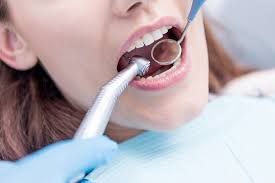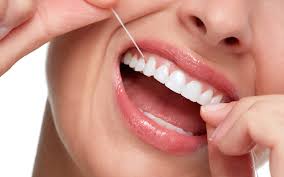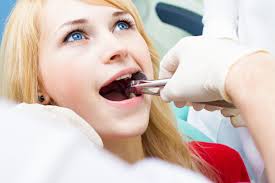What happens if you never go to dentist?
Going to the dentist every six months sometimes can feel too frequent. Can anything change in a mere six months?
Many adults skip going to the dentist every six months for a variety of reasons including fear, embarrassment, forgetfulness and inconvenience.
While it may be a hassle to see your dentist every six months, what will happen to your teeth if you don’t regularly see your dentist? The answers are not pleasant:
Plaque Buildup
When you skip a thorough cleaning at the dentist office, the plaque trapped in those hard-to-reach-places will harden into tartar. Tartar is difficult to remove with at-home brushing and flossing. The dentist will have additional equipment that will better remove the tartar.
Even the best at-home dental hygiene practices will not prevent plaque from being left on teeth and accumulating.
Tooth Decay
The build-up of plaque and the formation of tartar will lead to tooth decay if not treated by a dentist. Tooth decay can lead to a mess of other dental health issues including bad breath and ultimately tooth loss.

Tooth Loss
Tooth loss can be the result of either advanced, untreated tooth decay or advanced, untreated gum disease. Regular visits to the dentist will help prevent either of these unpleasant oral health issues from progressing to the point where tooth loss occurs.
Gum Disease
It can be easy to forget about the health of your gums, especially if they aren’t painful or causing any kind of discomfort. Gingivitis, or early stage gum disease can be present even in red and swollen gums that feel fine. Patients who don’t visit the dentist risk their gingivitis turning into the much more serious periodontal disease. It is common that patients with advanced stages of periodontal disease experience jaw bone loss and tooth loss.
Regular visits to your dentist allows a dental professional to perform an early diagnosis to catch and treat gingivitis at an early stage.
Bad Breath
All the bacteria, plaque and tartar build up in your mouth will lead to less-than-pleasant smelling breath. Bad breath can also be the result of periodontal disease, something you may not catch if you don’t see your dentist.

Cavities
Cavities are the obvious and likely outcome of a mouth that hasn’t been cleaned or examined by a dentist for some time. The build-up of bacteria, plaque and tartar gradually eat away at tooth enamel, causing holes in the tooth. These are cavities. Small cavities can be easily filled. Large, extensive cavities, however require more dental work such as crowns and possibly a root canal. Patients who don’t see their dentist regularly risk their small, easily treated cavity turning into a much larger, harder to treat one.
Tooth Stains
The accumulation of tartar and plaque will not only increase the risk of cavities and tooth decay, but they will also leave an unpleasant stain on your teeth which will only get worse the longer you put off going to the dentist.
Oral Cancer
Each time you visit the dentist for a teeth cleaning, an examination is also done. Part of this dental exam includes a screening for oral cancer. The longer you postpone going to the dentist, the longer you’ll go without checking for potentially deadly oral cancer. If you haven’t gone to the dentist for an extended period, you may be at risk of having the onset of oral cancer and not know it.

Risk of Disease and Illness in Other Parts of the Body
More studies and research have linked one’s oral health to one’s overall health. Patients who neglect proper care of their mouths by not regularly seeing a dentist, risk not only getting tooth and gum disease, but they also risk getting diseases and illnesses in other parts of their body. Some major health conditions related to oral health include heart disease, diabetes, stroke and breast cancer.
Abscesses and Infections
The longer one goes without going to the dentist, the longer any abscesses or cuts can spread and get infected. Some abscesses are not readily noticed and can only be detected via x-ray, which any dental office will have. Infections can lead to pain, discomfort and additional oral health concerns that require additional treatment.
Things That Happen If You Avoid the Dentist
Many people believe good oral care means they only need to brush their teeth once or twice each day, and floss once daily. While these are important actions, it’s also necessary to schedule regular dental appointments for a checkup and professional teeth cleaning.
Consider four things that happen if you don’t:
- Tooth decay – Daily tooth brushing and flossing help keep plaque under control. Plaque is created by food particles that join with bacteria to form a substance that adheres to teeth. If not removed, plaque can break down tooth enamel and cause decay. During regular dental checkups, dental professionals clean and remove plaque. Skipping these appointments allows bacteria to flourish and attack your teeth and gums, and create decay that may require extensive restorations, such as a root canal or crown, and also cause bad breath.
- Gum disease – Untreated tooth decay can lead to gum or periodontal disease. The gums are designed to provide a tight cover around your teeth and roots. Plaque bacteria can attack the gums, causing swelling and bleeding, allowing bacteria to settle underneath. If not treated properly, this condition, called gingivitis, can lead to periodontal disease.
- Health problems – During a checkup, dental professionals also may detect signs of serious medical problems. Catching these problems early may help you avoid expensive medical bills. If you don’t regularly see the dentist, health problems, such as hypertension, diabetes, oral cancers, kidney failure and heart disease may not be discovered until they’re in a more advanced stage. Often it’s because people see their dentist more often than their regular medical doctor.
- Stains – Drinking coffee, tea and wine, or smoking cigarettes can stain teeth and create an unattractive smile. Professional teeth cleanings help remove stains. However, dark discolorations may require cosmetic dentistry procedures to remove stains and whiten teeth.